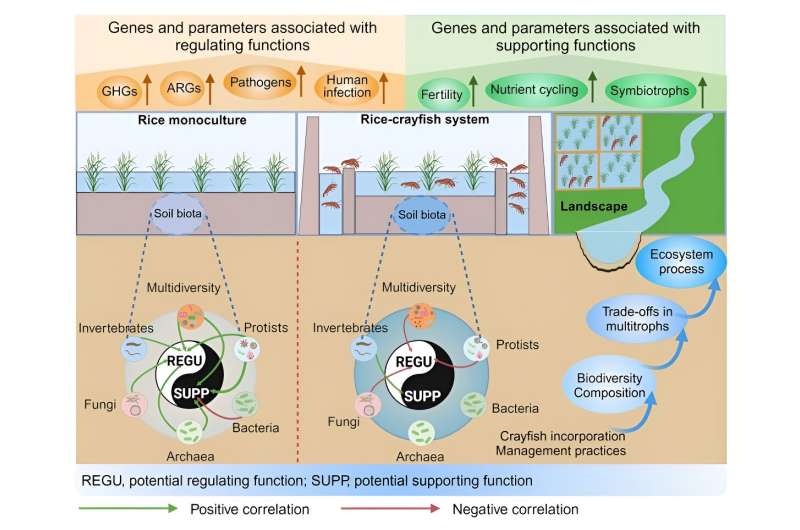
Global food security is currently challenged by global changes, population expansion, and resource constrains. Integrated farming has been proposed as a sustainable approach to boost food production by taking advantage of the synergies between contrasting edible animal and crop species.
The inclusion of aquatic animals such as crayfish, carp, and crab into rice farming systems is prevalent in China and many other Asian countries (e.g., India, Thailand, and Vietnam). The total area of rice-aquatic animal coculture in China reached 2.32 million hectares in 2019, and the area keeps increasing at a rate of ~14% per year.
Yet, the effects of integrated farming on soil biodiversity and functions remain poorly understood, though they provide the foundation of these integrated ecosystems.
In this study led by Prof. Wenfeng Tan (Huazhong Agricultural University, China) and Prof. Yu-Rong Liu (Huazhong Agricultural University, China), Jiao Feng et al. conducted a block design on 131 farmlands across the main integrated rice-aquatic animal farming areas of China (along ~1300 km transect), to assess the influences of integrated farming on a wide range of soil biodiversity and functional attributes. They found that the integrated rice-crayfish farming system resulted in significant trade-offs in biodiversity of different microbial groups (including soil invertebrates, protists, fungi bacterial, and archaea), compared with rice monocultures.
These taxonomic shifts further led to increased supporting services (e.g., soil fertility, nutrient cycling, and symbiotrophic colonization), while reduced the potential capacity of these ecosystems to support regulating services (e.g., increased proportion of genes linked with greenhouse gas emissions, antibiotic resistance genes, and human infections).
These findings provide novel evidence of fundamental trade-offs in key supporting and regulating services delivered by the integrated rice-crayfish faming system. These results indicate that environmental risks resulted from the rice-crayfish farming should be given sufficient attention for the long-term sustainability of these integrated systems, although food provision and economic profits are commonly the main priorities of agrosystems.
This team identifies a significant advancement in comprehensively evaluating the ecological consequence of integrated farming, and suggests that the integrated rice-crayfish farming and rice monoculture should be arranged at regional scales to optimize the delivery of multiple ecosystem services of farming systems.
The study is published in the journal Science Bulletin.
More information:
Jiao Feng et al, Effects of integrated rice-crayfish farming on soil biodiversity and functions, Science Bulletin (2023). DOI: 10.1016/j.scib.2023.08.037
Citation:
Effects of integrated rice-crayfish farming on soil biodiversity and functions (2023, October 26)
retrieved 26 October 2023
from https://phys.org/news/2023-10-effects-rice-crayfish-farming-soil-biodiversity.html
This document is subject to copyright. Apart from any fair dealing for the purpose of private study or research, no
part may be reproduced without the written permission. The content is provided for information purposes only.

